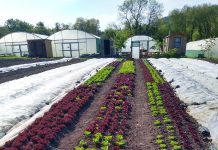Sprouts are delicious eaten raw, crunchy and slightly hot in flavour. Over-boiling has damaged the reputation of sprouts, as they are difficult to get just right when cooking next to over a dozen other dishes on Christmas Day. Do them a favour and stir fry with bacon and chestnut this year.
Generally, the earlier you sow, the earlier the sprouts form, regardless of variety. Plant between March and May, in March you may need to start them indoors for a healthy and strong start, and will harvest in the autumn. We start all ours in large modules, and plant out only the strongest plants, sinking them as far below ground level as we dare, to give them a strong stem.
To do well, the plants need 2 feet spacing each way, which looks like a lot of bare soil at the time, but which should fill by July. You could try planting a catch crop of early carrots or lettuce in the gaps.
All cabbage varieties are preyed on by a multitude of voracious pests. My answer is plenty of organic matter in the soil, and enviromesh. Enviromesh doesn’t look great and is expensive, but is wonderful. No caterpillars, root fly, flea beetle or pigeon damage.
In our area we had no Large Cabbage White caterpillars this year. Our curly kales and purple sprouting, which we can’t afford Enviromesh for, were untouched. More dry and hot years, please, obviously the butterfly didn’t like it. If your brassica were under large mesh netting, there was quite a bit of the small cabbage white caterpillar damage. Birds will eat the Small White but not the Large White, which has developed an unpleasant toxin to repel prey.
This Enviromesh, my favourite new toy, acts like a mini greenhouse, and in this dry summer cut out much wind, and so the need for water, and our cabbages are bigger than ever. Not to mention our leeks, kept completely clear of the dreaded leek moth. If you suffer from flea beetle, get that mesh or fleece on the day you plant, and seal firmly at soil level.
This Enviromesh is useful also for keeping cabbage root fly at bay if you are growing in an allotment. Growing your own plants will avoid the introduction of nasties such as cabbage root fly and clubfoot.
Getting back to sprouts, F1 varieties are reckoned to give best results, with lots of uniform sized and firm sprouts. Generally you get quite a few seeds in each packet, around 150 even for F1, which will last most growers for several years. This year I used 3 year old organic F1 Igor seeds. My planting in May was on the late side, and they’ll most likely be ready after Christmas.
Not only do you get the sprouts, but also the top growth of the plants, delicious cooked whole. If your sprouts are loose rather than tight buttons, the flavour is just as good. A busy mole has moved in under ours this year, but the sprouts are looking tight, even though they like firm soil.
What’s the most popular wine at a Christmas meal? “Do I have to eat my Brussels sprouts?”








